新概念2册第一课教案
新概念英语第二册第一课详细教案

课文:Last week I went to the theatre. I had a very good seat. The play was very interesting. I did not enjoy it. A young man and a young woman were sitting behind me. They were talking loudly. I got very angry. I could not hear the actors. I turned round. I looked at the man and the woman angrily they did not pay any attention. In the end, I could not bear it. I turned round again. “I can’t hear a word!〞I said angrily. “It’s none of your business〞, the young man said rudely, “This is a private conversati on!〞*本课重点语法:一般过去时、过去进行时英语的时态细分共有16种,其中较多用的为9种:第一课分析其中三种:一般现在时,一般过去时和过去进行时1.经常、反复或是习惯性发生的动作,如I go to work at 0900 every day. 我每天9点钟上班。
She does not take dinner on Sundays. 她周日晚上都不吃晚餐。
2.某种事物目前存在的情况或状态,如There are 16 cabins available on Classica Feb 18 dep.目前经典号0218航次剩余16个舱位。
3.表示主语的习惯、能力、职业、特征等,如Sunwen works as a sales manager in Costa, he has rich experience.4.有时间规律发生的事件或是不受时间限制的客观事实,如The earth moves around thesun. 地球绕着太阳转。
新概念2册第一课教案
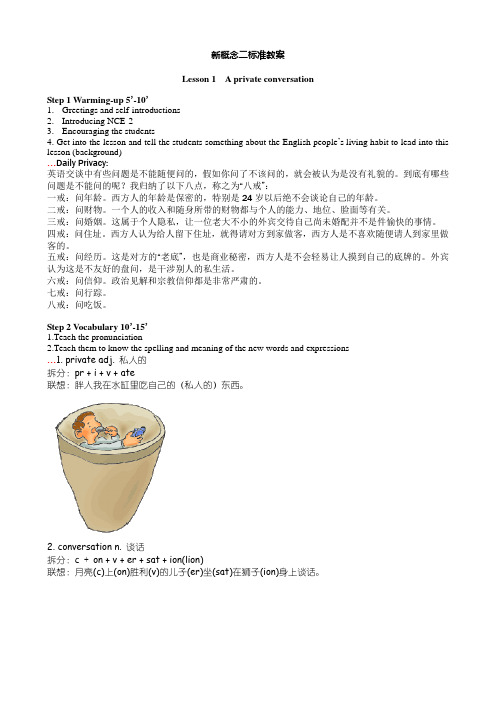
新概念二标准教案Lesson 1 A private conversationStep 1 Warming-up 5’-10’1.Greetings and self-introductions2.Introducing NCE-23.Encouraging the students4. Get into the lesson and tell the students something about the English people’s living habit to lead into this lesson (background)…Daily Privacy:英语交谈中有些问题是不能随便问的,假如你问了不该问的,就会被认为是没有礼貌的。
到底有哪些问题是不能问的呢?我归纳了以下八点,称之为“八戒”:一戒:问年龄。
西方人的年龄是保密的,特别是24岁以后绝不会谈论自己的年龄。
二戒:问财物。
一个人的收入和随身所带的财物都与个人的能力、地位、脸面等有关。
三戒:问婚姻。
这属于个人隐私,让一位老大不小的外宾交待自己尚未婚配并不是件愉快的事情。
四戒:问住址。
西方人认为给人留下住址,就得请对方到家做客,西方人是不喜欢随便请人到家里做客的。
五戒:问经历。
这是对方的“老底”,也是商业秘密,西方人是不会轻易让人摸到自己的底牌的。
外宾认为这是不友好的盘问,是干涉别人的私生活。
六戒:问信仰。
政治见解和宗教信仰都是非常严肃的。
七戒:问行踪。
八戒:问吃饭。
Step 2 Vocabulary 10’-15’1.Teach the pronunciation2.Teach them to know the spelling and meaning of the new words and expressions…1. private adj. 私人的拆分:pr + i + v + ate联想:胖人我在水缸里吃自己的(私人的)东西。
新概念英语第二册第一课详细教案
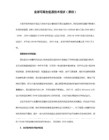
语一般为名词、代词或名词短语,通常位于动词之前。动词必须
“一致”,所以主语决定动词的单复数形式(如 I am, you are, he
。宾语一般为名词、代词或名词短语。在主动句中,宾语一般位
副词时,地点副词的一般位置是在方式副词
通常我们讲
be动词的适当形式填空。
2 / 7
Yesterday was______ the first of
All the students __are____ very excited.
______________________________________________
上教堂,去做礼拜 (cf.第1册第68课at school, at church;
1册第85课have been to school/church)
座位很好
一般指戏院、汽车等配置的固定座位,也可以抽象地表示“座位”
汽车的前座
请坐。
戏很有意思。
属于现在分词形式的形容词,意思是“使人感兴趣”。
fall sick。
4 / 7
上星期我去看戏。
句首的“Last week”点明叙述的事情发生的时间是上星期。因此整
(包括过去进行时),直接引语部分的
动词go的原义是离开一个地方去另一个地方,与介词to连用后,
请注意在以下的短语中名词前通常不加冠词:
上学
上床睡觉
1 / 7
:
( he, she, it,
,动词的词尾要加-S。(一般的动词词尾+S。以sh/ch/s/x结尾的
+es.以辅音字母Y结尾的把Y变成i,+es。辅音字母+o结尾的+es.)
新概念2第一课教案
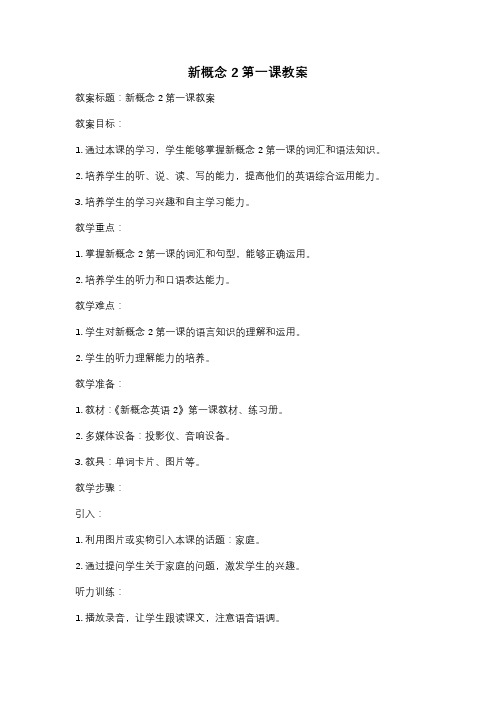
新概念2第一课教案教案标题:新概念2第一课教案教案目标:1. 通过本课的学习,学生能够掌握新概念2第一课的词汇和语法知识。
2. 培养学生的听、说、读、写的能力,提高他们的英语综合运用能力。
3. 培养学生的学习兴趣和自主学习能力。
教学重点:1. 掌握新概念2第一课的词汇和句型,能够正确运用。
2. 培养学生的听力和口语表达能力。
教学难点:1. 学生对新概念2第一课的语言知识的理解和运用。
2. 学生的听力理解能力的培养。
教学准备:1. 教材:《新概念英语2》第一课教材、练习册。
2. 多媒体设备:投影仪、音响设备。
3. 教具:单词卡片、图片等。
教学步骤:引入:1. 利用图片或实物引入本课的话题:家庭。
2. 通过提问学生关于家庭的问题,激发学生的兴趣。
听力训练:1. 播放录音,让学生跟读课文,注意语音语调。
2. 播放录音,学生听录音并完成相关的听力练习。
3. 分组进行对话练习,模仿录音中的对话内容,练习听力和口语表达能力。
语言知识讲解:1. 教师介绍本课的重点词汇和句型,并进行解释和示范。
2. 学生跟读词汇和句型,进行口语练习。
语法练习:1. 学生根据教师的指导,完成相关的语法练习。
2. 教师对学生的练习进行纠正和指导。
拓展活动:1. 学生分组进行角色扮演,模拟对话情景,练习语言交际能力。
2. 学生自由发挥,用所学知识编写小短文,展示他们的写作能力。
总结:1. 教师对本课的重点内容进行总结,并进行复习。
2. 学生进行小结,回答教师提出的问题。
作业布置:1. 布置课后作业,包括完成练习册相关练习、背诵课文等。
2. 鼓励学生自主学习,提供相关学习资源和建议。
教学反思:1. 教师对本节课的教学效果进行评估和反思。
2. 教师根据学生的反馈和表现,调整教学策略和方法。
注:以上教案仅为示例,实际教案编写时应根据具体教学内容和学生特点进行调整和完善。
教案新概念英语第二册标准教案第一课
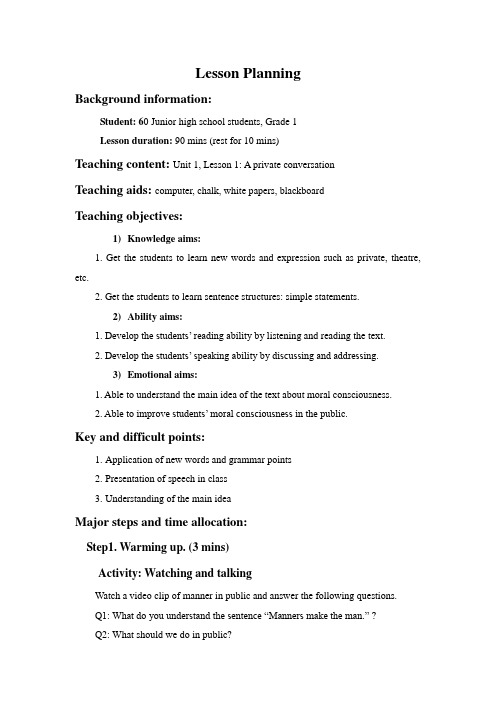
Lesson PlanningBackground information:Student: 60 Junior high school students, Grade 1Lesson duration: 90 mins (rest for 10 mins)Teaching content: Unit 1, Lesson 1: A private conversationTeaching aids: computer, chalk, white papers, blackboardTeaching objectives:1)Knowledge aims:1. Get the students to learn new words and expression such as private, theatre, etc.2. Get the students to learn sentence structures: simple statements.2)Ability aims:1. Develop the students’ reading ability by l istening and reading the text.2. Develop the students’ speaking ability by discussing and addressing.3)Emotional aims:1. Able to understand the main idea of the text about moral consciousness.2. Able to improve students’ moral consciousness in the publi c.Key and difficult points:1.Application of new words and grammar points2.Presentation of speech in class3.Understanding of the main ideaMajor steps and time allocation:Step1. Warming up. (3 mins)Activity: Watching and talkingWatch a video clip of manner in public and answer the following questions.Q1: What do you understand the sentence “Manners make the man.” ?Q2: What should we do in public?Step2. Pre-reading. (3 mins)Activity: Listening.Listen to the tape and then answer the question.Q: Why did the writer complain to the people behind him?Step3. While-reading. (10 mins)Activity 1: Skimming. (4 mins)Read the whole text and answer the following questions.Q1: What is the writing style of the text, narrative writing or descriptive writing?Q2: What is the general idea of the text?Activity 2: Scanning. (6 mins)Scan the text and complete the following tabulation.6 1 2 3 4 5 6When? Who?which?what? Action Who?which?what?How? Where? When?Last week I went to thetheatreI had a verygood seatThe play was veryinterestingI did notenjoythe playA young man and a young womanweresittingbehindmeThey weretalkingloudlyActivity 3: Close reading. (24 mins)1)Vocabulary and phrase.private adj.私人的conversation n.对话theatre n.戏院attention n.注意bear v.容忍turn round 转身pay attention注意none of your business不关你的事2)Sentence structures.1.Simple statements: A statement that tells us about one thing is a simple statement.2.Word order of simple statements: The order of words in a statement can affect the meaning of the statement.3)The tense.1.the past tense2.past continuous tense3.the present tense4)Main idea .Summarize the main idea of this text: Good manners in public are very important.Have a short break. (10 mins)Step4. Post-reading. (38 mins)Activity1. Make a short speech. (15 mins)Make a short speech about manners in public according to the following key words:speak loudly, rudely, knock at the door, spit, smoke, lady first...Activity2. Group work. (10 mins)Discuss with your partner “What did you do yesterday after school?”Use the simple statement to express your idea with right tense.Activity3. Exercise. (13 mins)Do exercise B on your textbook and then we will check it.Homework. (2mins)Finish the rest of exercises on your textbook and preview the next text.。
新概念第二册第一课教案
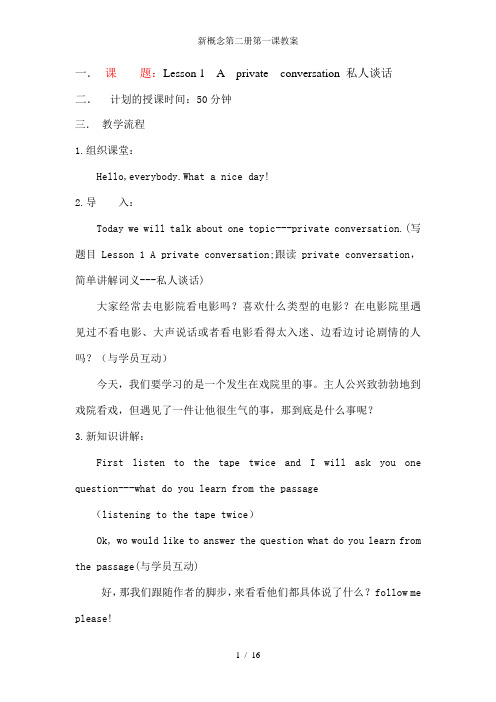
一.课题:Lesson 1 A private conversation 私人谈话二.计划的授课时间:50分钟三.教学流程1.组织课堂:Hello,everybody.What a nice day!2.导入:Today we will talk about one topic---private conversation.(写题目Lesson 1 A private conversation;跟读private conversation,简单讲解词义---私人谈话)大家经常去电影院看电影吗?喜欢什么类型的电影?在电影院里遇见过不看电影、大声说话或者看电影看得太入迷、边看边讨论剧情的人吗?(与学员互动)今天,我们要学习的是一个发生在戏院里的事。
主人公兴致勃勃地到戏院看戏,但遇见了一件让他很生气的事,那到底是什么事呢?3.新知识讲解:First listen to the tape twice and I will ask you one question---what do you learn from the passage(listening to the tape twice)Ok, wo would like to answer the question what do you learn from the passage(与学员互动)好,那我们跟随作者的脚步,来看看他们都具体说了什么?follow me please!(Read the passage following me and read it by the students themselves)生词与短语讲解:1.private/`praivit/adj.○1私人的,秘密的a private conversation/letter 私人交谈/信函Eg: they were sharing a private joke.他们讲着外人听不懂的笑话。
新概念第二册第一课教案

新概念第二册第一课教案教案标题:《新概念第二册第一课教案》教案目标:1. 通过本课的教学,学生能够掌握并正确运用本课所涉及的词汇和语法知识。
2. 培养学生的听、说、读、写能力,提高他们的英语综合运用能力。
3. 培养学生的合作意识和团队精神,通过小组活动促进学生之间的互动与合作。
教学重点:1. 通过听力训练,学生能够理解并正确运用本课所涉及的词汇和语法知识。
2. 通过口语训练,学生能够流利地表达自己的观点和意见。
3. 通过阅读训练,学生能够理解并运用本课所涉及的词汇和语法知识。
4. 通过写作训练,学生能够独立撰写一篇关于自己的家庭的短文。
教学准备:1. 课件、录音机、幻灯片等教学辅助工具。
2. 学生练习册、课本及相关教材。
3. 学生小组活动所需的材料。
教学过程:Step 1: 导入 (5分钟)1. 利用图片或实物引入本课话题,激发学生的学习兴趣。
2. 利用问题导入,如“你家有几口人?你们都住在一起吗?请介绍一下你的家庭。
”Step 2: 听力训练 (15分钟)1. 播放录音,让学生跟读并理解录音中的对话内容。
2. 分组进行听力练习,要求学生能够听懂并回答与家庭成员相关的问题。
3. 教师讲解并操练本课所涉及的词汇和语法知识。
Step 3: 口语训练 (15分钟)1. 学生分组进行角色扮演,模拟对话中的情景,练习表达自己的家庭情况。
2. 教师引导学生进行问答练习,加深对话内容的理解并提高口语表达能力。
Step 4: 阅读训练 (15分钟)1. 学生独立阅读课文,理解并标记重点词汇和句子。
2. 学生小组合作,回答与课文内容相关的问题,加深对课文的理解。
Step 5: 写作训练 (15分钟)1. 学生根据所学内容,独立撰写一篇关于自己家庭的短文。
2. 学生小组互相交换并修改彼此的短文,提高写作质量。
3. 部分学生上台展示自己的短文,进行同伴评价和教师点评。
Step 6: 小结与延伸 (5分钟)1. 教师对本课内容进行总结,并强调学生在学习过程中的进步和发现。
新概念2第一课教案

Lesson 1 - A private conversation一、教学重点1、句法:简单陈述句的句子成分(故事六要素)。
3、习语:I can not bear it! It’s none of your business!二、教学步骤【第一节课】1、引入话题(详见右框)。
2’2、听一遍音频,掌握大意。
1’①Where did the writer go last week?②Why didn’t he enjoy the play?③What did the young man say to the writer?3、生词解读,纠正发音(详见课本)。
5’4、提问:Why did the writer complain to the peoplebehind him? 看一遍视频,解答问题。
2’(屏幕升起)5、精讲课文,板书和笔记(详见下文)。
20’6、文化背景(详见下文)。
2’7、再听一遍音频,逐句跟读。
3’8、学生自己大声朗读。
5’(课间时可让学生先看看15页的两道选择理解题)【第二节课】1、做15页的两道选择理解题(详见课本)。
5’2、检查朗读,一起朗读,注意每一句话。
10’3、讲解简单陈述句的概念(详见下文)。
5’4、游戏:讲故事的六要素(详见下文)。
15’5、练习分析课文中每句话的要素构成。
5’6、做14页的排列句子成分练习题。
7’7、做15页最后一道句子结构题(详见课本)。
3’【第三节课】(屏幕放下)1、超级情景背诵图讲解。
5’2、背课文比赛。
20’3、听一首英文歌曲《I believe I can fly》。
7’4、听写单词,记忆法指点。
10’5、总结本课出现的三种时态:一般过去时、过去进行时、一般现在时(详见下文)。
5’6、总结本课重点,让学生标注(详见上文)。
2’7、布置作业:摘要写作,15页的选择题,背课文和单词。
1’三、精讲课文1、Last week 上周。
这个词组奠定了本课用一般过去时的基础。
- 1、下载文档前请自行甄别文档内容的完整性,平台不提供额外的编辑、内容补充、找答案等附加服务。
- 2、"仅部分预览"的文档,不可在线预览部分如存在完整性等问题,可反馈申请退款(可完整预览的文档不适用该条件!)。
- 3、如文档侵犯您的权益,请联系客服反馈,我们会尽快为您处理(人工客服工作时间:9:00-18:30)。
新概念二标准教案Lesson 1 A private conversationStep 1 Warming-up 5’-10’1.Greetings and self-introductions2.Introducing NCE-23.Encouraging the students4. Get into the lesson and tell the students something about the English people’s living habit to lead into this lesson (background)…Daily Privacy:英语交谈中有些问题是不能随便问的,假如你问了不该问的,就会被认为是没有礼貌的。
到底有哪些问题是不能问的呢?我归纳了以下八点,称之为“八戒”:一戒:问年龄。
西方人的年龄是保密的,特别是24岁以后绝不会谈论自己的年龄。
二戒:问财物。
一个人的收入和随身所带的财物都与个人的能力、地位、脸面等有关。
三戒:问婚姻。
这属于个人隐私,让一位老大不小的外宾交待自己尚未婚配并不是件愉快的事情。
四戒:问住址。
西方人认为给人留下住址,就得请对方到家做客,西方人是不喜欢随便请人到家里做客的。
五戒:问经历。
这是对方的“老底”,也是商业秘密,西方人是不会轻易让人摸到自己的底牌的。
外宾认为这是不友好的盘问,是干涉别人的私生活。
六戒:问信仰。
政治见解和宗教信仰都是非常严肃的。
七戒:问行踪。
八戒:问吃饭。
Step 2 Vocabulary 10’-15’1.Teach the pronunciation2.Teach them to know the spelling and meaning of the new words and expressions…1. private adj. 私人的拆分:pr + i + v + ate联想:胖人我在水缸里吃自己的(私人的)东西。
2. conversation n. 谈话拆分:c + on + v + er + sat + ion(lion)联想:月亮(c)上(on)胜利(v)的儿子(er)坐(sat)在狮子(ion)身上谈话。
3. theatre n. 剧场,戏院拆分:the + a + tre(e)联想:剧场在这样的一棵树旁边。
音标修正:〔 〕所以树tree只有一个。
4. loudly adv. 大声地->loud adj. 高声的拆分:loud + ly联想:loudly发音是“老的”,对老的人说话要大声一点。
5. attention n. 注意拆分:at + ten+t(l)ion联想:在有十头狮子的地方一定要注意了。
6. business n. 事拆分:bus + in + e + ss联想:公共汽车里鹅与两条蛇谈生意。
7. rudely adv. 无礼地,粗鲁地拆分:rude + ly->rude adj. 无礼的拆分:ru + de联想:如(ru)果德(de)性差,就会很无礼3.play some words gamesStep 3 Presentation 30’-35’1.Listen to the tape 5’2.Look at the pictures, introduce story, explain the phrases and grammar. (关于语法点,请老师根据课时实际安排调整内容多少)1. Private: adj. 形容词a. personal, belong to or for the use of one person 私人的e.g. This is a private conversation.b. Secret 秘密的e.g. Don’t tell the other s, because this is privatec. carried out by individual, not state-owned 私营的e.g. private school私立学校反义词public school 公立学校Stanford University: 斯坦福大学,美国著名私立大学词组:in private: 反义词in publice.g. He supported the plan in public, but in private he knew it was not good文化:但被问道年纪等自己不愿意回答或者不便回答的问题时,可以选择使用private -How old are you?-Sorry, this is a private question.2. Conversation: n. informal talk 非正式会谈conversation 一般用于正式文体中,内容上却往往不正式。
e.g. This is a private conversation.用法:have a + conversation3. theatre: n. a place to watch plays 剧院、戏院st week, I went to the theatre.词组:go to movies, go to the cinema, go to see the film,4. seat: n. a place to sit in 座位e.g. I had a very good seat.词组:take a seate.g. Ladies and gentlemen, please be seated!I seated the boy next to me.She seated herself on the sofa.文化:Sit down, please. (命令性)Take your seat, please. (一般性)Be seated, please. (更礼貌、正式)5. play: n. 戏剧e.g. The play was very interesting.Shakespeare was famous for his plays.词组:Playboy:花花公子role play:对话练习fair play:公平比赛6. loudly: adv. 大声地e.g. They were talking loudly.loud: adj. 大声的e.g. The music is too loud, please turn it down.adv. 大声地7. angry: adj.生气的e.g. I got very angry.angrily: adv. 生气地e.g. I looked the young man and the young women angrily.8. attention: n. 注意e.g. They did not pay any attention.词组:pay attention to 注意…9. bear: v.a. stand 承受、忍受e.g.In the end, I couldn’t bear it.n. 熊e.g. Koala bear 考拉熊polar bear 北极熊同义词:stand/ put up with/10.business:a. task, duty 任务、工作e.g.It’s none of your business.b. trade 生意、商业、买卖e.g. Business is Business. 公事公办词组:business hours 办公时间business card 名片businessman 商人文化:Mind your own business! 不要狗拿耗子,多管闲事。
11. rudely: adv. not politely 粗鲁的,不礼貌的e.g. The young man said rudely.同义词:rough/ vulgar/ impoliteStep 4 Reciting 20’Step 5 Rap 20’Step 6 Oral practice 20’1.ReviewT: 上个星期我去看戏。
S:Last week I went to the theatre.T: ……S: ……2.Imitation老师自己或者让学生们去替换文中的人物,场景,或者地点。
(此项也可以作为家庭作业布置下去)Change the hero of the movie from “I” into somebody else, and let students practice in pairs.If possible, ask some students to perform out a new story with the help of the teacher.Example, tell students that the name should be changed into “John”, the place into “cinema”.Step 7 Homework1.Recite lesson 12.copy words and phrases 5 times3.Finish exercises , multiple choice questions and sentences structure4.Preview lesson 2精华语句:(供教师学习.参考)1.The play was very interesting. I did not enjoy it.[改装] The paly was very interesting, but I had no way to enjoy it.[模仿] Everyone says he is a very funny man, but I don’t like him.2. A young man and a young woman were sitting behind me.[改装] Sitting behind me were a young man and a young woman.[模仿] Talking to me on the phone was my boss.3.In the end, I could not bear it.[改装] In the end, I lost my patience.[模仿] In the end, I could not put up with him any more.4. It’s none of your business.[改装] It has nothing to do with you at all.[模仿] The matter is none of my business.NEW CONCEPT ENGLISH BOOK 2practice : 训练, progress : 进步If you practice more, then you can make great progress.五项综合训练技能listening : 听力speaking : 说话grammar : 语法 writing : 写作reading : 阅读translation : 译 knowledge +skillsLesson 1 A private conversation【New words and expressions】(12)private adj. 私人的conversation n. 谈话theatre n. 剧场,戏院seat n. 座位play n. 戏loudly adv. 大声地angry adj. 生气的angrily adv. 生气地attention n. 注意bear v. 容忍business n. 事rudely adv. 无礼地,粗鲁地★private adj.私人的① adj. 私人的private life 私生活private school 私立学校It's my private letter. (如果妈妈想看你的信)It's my private house. (如果陌生人想进你的房子)② adj. 普通的private citizen 普通公民I’m a private citizen. (citizen n. 公民)private soldier 大兵《Private Ryan》(《拯救大兵瑞恩》)public adj. 公众的,公开的(private的反义词)public school 公立学校public letter 公开信public place 公共场所privacy n.隐私It’s privacy. 这是我的隐私!(不愿让别人知道的)★conversation n.谈话have a + talk/chat/dialogue/conversation/gossip 名词变动词conversation 一般用于正式文体中, 内容上往往不正式subject of conversation 话题They are having a conversation.talk 内容可正式可不正式, 也可以私人Let’s have a talk.dialogue 对话, 可以指正式国家与国家会谈China and Korea are having a dialogue.chat 闲聊,就是北京人说的“侃”,说的是无关紧要的事。
